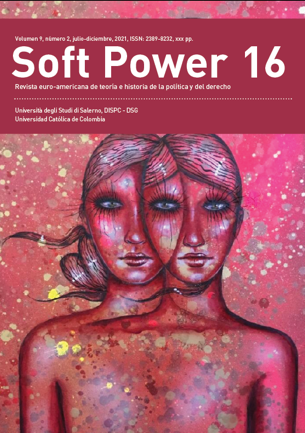
Esta obra está bajo una licencia internacional Creative Commons Atribución-NoComercial 4.0.
Al enviar los artículos para su evaluación, los autores aceptan que transfieren los derechos de publicación a Soft Power. Revista Soft Power para su publicación en cualquier medio. Con el fin de aumentar su visibilidad, los documentos se envían a bases de datos y sistemas de indización, así mismo pueden ser consultados en la página web de la Revista.Resumen
El ensayo investiga algunos aspectos relativos a esa ‘economía de las prácticas’ puesta en cuestión por Hortense Spillers para indicar el proceso simbólico y material que ha determinado el concepto de Mujer de Color y ha configurado la subordinación del cuerpo
femenino negro, excluido del género y, al mismo tiempo, deslizado en los intersticios de ese peculiar orden colonial del discurso originado en el capitalismo. Partiendo de la parcialidad histórica de la “negritud”, las pensadoras negras feministas han mostrado
el funcionamiento interrelacionado de la dominación masculina y racial dentro del discurso moderno, sentando las bases para reorganizar el campo práctico de la verdad producido por la razón científica en orden al principio de la clasificación humana.
Palabras clave

Citas
Bordieu, P. (2016). La Domination masculine. Paris: Seuil.
Chicchi, F. (2019). Karl Marx. La soggettività come prassi. Milano: Feltrinelli.
Cooper, A. J. (1988). A Voice from the South. New York: Oxford University Press.
Cooper, M. (2017), Family Values. Between Neoliberalism and the New Social Conservatism.
New York: Zone Books.
Cuvier, G. (1863). The Animal Kingdom Arranged according to Its Organization. London:
Henry G. Bohn.
Darwin, C. [1859] 1994. The Origin of Species by Means of Natural Selection; or, The Preservation
of Favored Races in the Struggle for Life. London: Studio Editions.
Da Silva, D. F. (2007). Toward a global idea of race. Minneapolis: University of Minnesota
Press.
Da Silva, D. F. (2017). The Scene of Nature, in J. Desautels-Stein, C. Tomlins (Eds.),
Searching for Contemporary Legal Thought. (pp. 275-289). Cambridge: Cambridge
University Press.
Du Bois, W.E.B. [1903] (2010). Alle Nazioni del Mondo, in S. Mezzadra (Ed.). Sulla linea
del colore. Razza e democrazia negli Stati Uniti e nel mondo. (pp. 151-153). Bologna:
Il Mulino.
Eze, C. (2001). Achieving Our Humanity. The Idea of the Postracial Future. London:
Routledge.
Galli, C. (2001). Spazi politici. L’età moderna e l’età globale. Bologna: Il Mulino.
hooks, b. (1981). Ain’t I a Woman. Black Women and Feminism. London: Pluto Press.
hooks, b. (1984). Feminist Theory. From Margin to Center. Boston: South End Press.
hooks, b. (1989). Yearnings. Race, Gender and Cultural Politics. New York - London:
Routledge.
hooks, b. (1994) Teaching to Transgress. Education as the Practice of Freedom. London:
Routledge.
Foucault, M. (1976). Histoire de la sexualité. 1. La volonté de savoir. Paris: Gallimard.
Fraisse, G. (2016). La sexuation du monde: réflexions sur l’émancipation. Paris: Presses
de Sciences Po.
Hall, S. (2017). Selected Political Writing. Durham: Duke University Press.
Lonzi, C. (2010). Sputiamo su Hegel e altri scritti. Milano: et al. Edizioni.
May, V. M. (2007). Anna Julia Cooper, Visionary Black Feminist. New York - London:
Routledge.
McClintock, A. (1995). Imperial Leather. Race Gender and Sexuality in the Colonial Contest.
New York, London: Routledge.
Mignolo, W. (2011). The Darker Side of Western Modernity. Global Futures, Decolonial
Options. Durham & London: Duke University Press.
Moynihan, D. (1965) The Negro Family: The Case For National Action. in Rainwater
L. & Yancey W. L. (Eds.) (1967), The Moynihan Report and the Politics of Controversy.
Cambridge, MA: MIT Press.
Nadotti, M. (2020). Introduzione a b. hooks. Elogio del Margine. (pp. 19-27). Napoli:
Tamu Edizione.
Moi, T. What is a Woman? And Other Essays. New York, London: Routledge.
Morrison, T. (1971) What the Black Woman Thinks About Women’s Lib. The New York Times.
https://www.nytimes.com/1971/08/22/archives/what-the-black-woman-thinksabout-
womens-lib-the-black-woman-and.html/
Morrison, T. (1987). Beloved. London: Vintage Classics. Penguin Books.
Morrison, T. (1933). Nobel Lecture. https://www.nobelprize.org/prizes/literature/1993/
morrison/lecture/
Pateman, C. (1988). The Sexual Contract. Cambridge: Polity Press.
Rousseau J.J. (1964). OEuvres completes, 3. Paris: Gallimard.
Rudan P. (2020). Donna. Storia e critica di un concetto polemico. Bologna: Il Mulino.
Spillers, H. J. (1987). Mama’s Baby, Papa’s Maybe: An American Grammar Book. Diacritics,
(2), pp. 64-81. Culture and Countermemory. Johns Hopkins University
Press.
Spillers, H. J. (2003). Black, White, and in Color. Essays on American Literature and Culture.
Chicago: University of Chicago Press.
Vivan, I. (2009). Raccontare storie per costruire storia: la vicenda della schiavitù nella
narrativa di Toni Morrison. Storia Delle Donne, 5(1), pp. 29-52. Firenze: Firenze
University Press.
Ziarek, E. (1983). Feminist aesthetics and the politics of modernism. New York: Columbia
University Press.










